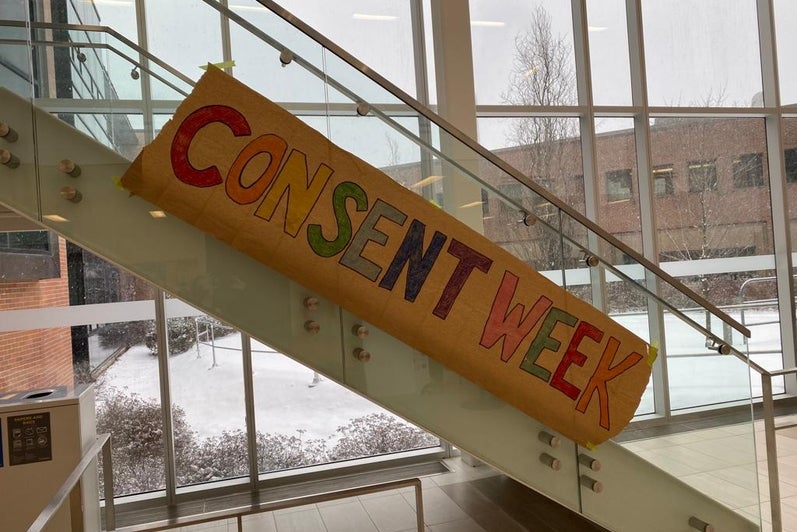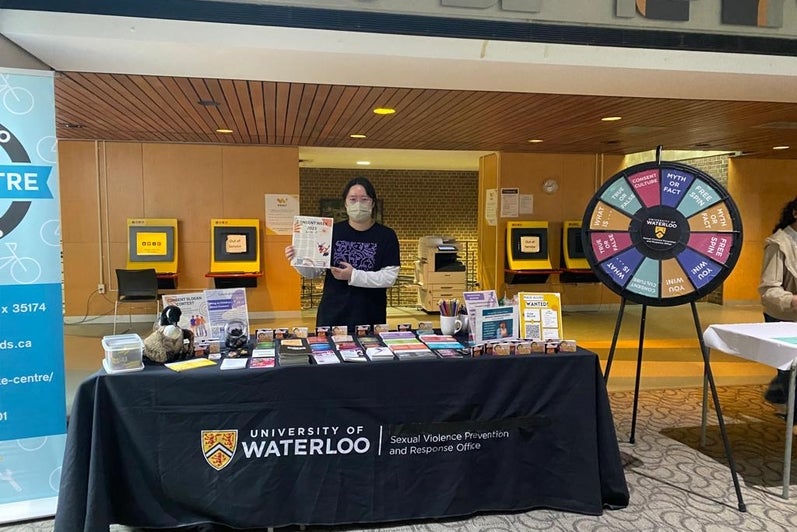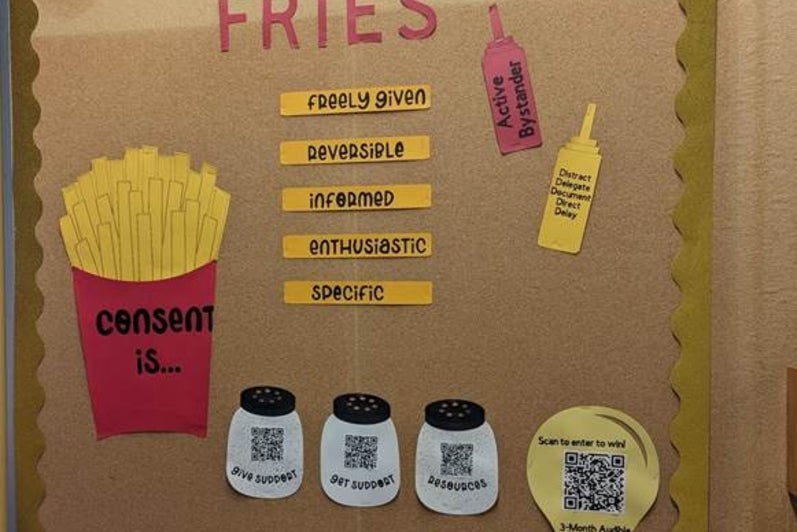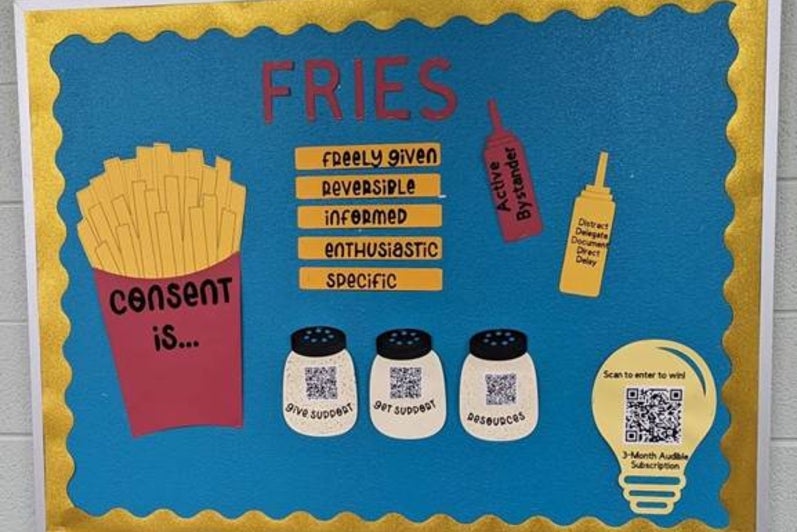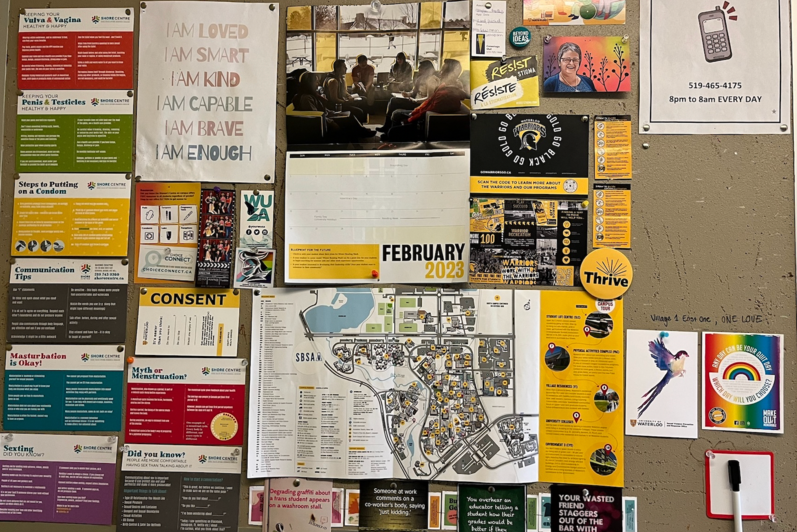#ConsentWeek
Consent Week is an opportunity for campus community members to engage in conversations, activities, and events focused on consent, in an effort to build a #ConsentCulture.
Consent Weeks are held twice a year, during the third week of September, and the fourth week of January.
Though talking about consent and advancing consent culture are work we do all year round, consent week enables us to intentionally:
- Normalize dialogue about consent
- Enhance nuanced understandings of consent
- Explore how to engage in healthy, positive, respectful relationships with each other
- Embed consent in our daily practices
- And highlight the services on and off campus available for support
Winter Consent Week: January 26-30 (with pre and post initiatives/events)
Consent Week Wheel and Booth
Wednesday January 21
11 – 4 PM
Main floor of E5/7
Drop-in event - no registration required
About: Join SVPRO at our interactive booth to spin the consent wheel, ask sexual health questions, learn about consent, and pick up resources, condoms, and SWAG!
Virtual Lunch & Learn: Talking to Young Children about Consent
Thursday February 22
12 PM – 1 PM
Virtual on Teams
Register on Portal
Bystander Intervention Training for Engineering Students
Thursday February 22
6 – 8 PM
PSE (formerly E7) 7303
Register on Portal
Consent Week Display Boards
January 26-30
About: check out our SVPRO Consent Week Display Boards in both the Dana Porter and Davis Centre libraries where you can find information and resources.
Consent Week Wheel and Booth
Monday January 26
11 – 4 PM
STC Lobby by Starbucks
Drop-in event - no registration required
About: Join SVPRO at our interactive booth to spin the consent wheel, ask sexual health questions, learn about consent, and pick up resources, condoms, and SWAG!
Fries for F.R.I.E.S Consent Event
Tuesday January 27
1 PM – 3 PM
SLC MPR
Drop-in event - no registration required
About: Join WUSA and SVPRO to learn the basics of consent - engage with consent information and receive free fries from the Bomber!
Consent Week Wheel and Booth
Wednesday January 28
11 – 4 PM
SLC Market Place
Drop-in event — No registration required
About:Join SVPRO at our interactive booth to spin the consent wheel, ask sexual health questions, learn about consent, and pick up resources, condoms, and SWAG!
Consent Week Wheel and Booth
Thursday January 29
11 – 4 PM
DC lobby across from Tim Horton’s
Drop-in event - No registration required
About: Join SVPRO at our interactive booth to spin the consent wheel, ask sexual health questions, learn about consent, and pick up resources, condoms, and SWAG!
Gaslight the Film and Bingo Event
Tuesday February 3
5:30 PM – 8:30 PM
SJ2 2002
About: Have you ever wondered where the term Gaslighting comes from? It comes from a 1940's
film staring Ingrid Bergman and Charles Boyer. Join the SRF Student Society and SVPRO to watch the film while playing Gaslight Bingo, followed by a discussion of what Gaslighting looks like in today's world, why it is harmful, and how we can intervene when we hear it. Prizes of Sex Toys and Self-Care items, Resources, condoms, SWAG and popcorn!
Register on Portal – limited seating.
Make Kindness the Norm Event
Thursday February 12
12 PM – 5 PM
SLC Market Place
Drop-in event - no registration required
About: Join SVPRO in making kindness the norm – learn about microaffirmations and what you can do to share kindness.
#Consent
What is consent?
Interacting consensually is important when building a culture of consent. Consent can be used with all our interactions. This includes our sexual interactions, but begins with our daily lives. To feel comfortable and confident giving and getting consent during intimate moments, we must first feel comfortable and confident giving and getting consent in other areas of our lives.
Put simply, consent is an agreement to do something, a conscious decision by all people involved to engage in a mutually agreed upon activity. Consent is about knowing and setting personal boundaries, while knowing and respecting the boundaries of others.
Consent is also:
-
reversible, you can change your mind at any time
-
a choice, everyone has the right to agree or disagree
-
provided without pressure, manipulation, threats or force
-
informed and specific, meaning you have all the information when making your decision
-
a continuous process and ongoing conversation
You cannot consent for your future self; giving and getting consent happens in the moment. Consent is not implied by your past behaviour or the relationship you are in. Silence does not equal consent. Consent should not be mysterious, if you are unsure or confused, ask for clarification. One of the easiest ways to know if you have consent is to ask. Someone who is asleep or passed out cannot consent. If you think someone may be too drunk or high to consent, it is always better to wait.
Things to think about:
Are you asking for a hug as you lean in, or are you respecting personal space and asking from 6 feet away? Asking as you are doing the behaviour is not consent. How are you asking? Is it phrased in a way that allows people to decline without feeling guilty, embarrassed, or rude?
Examples of asking for consent:
-
May I take your picture?
-
May I post this pic on Instagram?
-
Would you like to join me at Starbucks for a coffee at 10am tomorrow?
-
May I eat the last chocolate?
-
Are you sure this is OK?
-
What are your hard limits?
-
Will you rub my feet?
-
Do you want me to keep going? I can stop.
-
Before we go any further can we talk about condoms, dams, and birth control?
Consent is more than giving permission. It is a working agreement between all people involved. It can be altered, changed, updated, and taken back. The more often you talk about consent and boundaries, the easier and more normalized it becomes.
Power and Privilege
When thinking about consent, it is important to reflect on the power and privilege you hold in various spaces. When someone has more power and more privilege than someone else, it makes it difficult for the person with less power and less privilege to say "no". For example, a student may feel pressure to say "yes" to their professor or TA. Race, gender, class, sexual orientation, dis/ability, age, religion, and culture all play a role in how much power and privilege a person has.
It is important for the person with more power and privilege to recognize their position and not take advantage of it.
Things to think about:
In what situations and with whom, do you have more or less power? Are you asking people you have power over to do things they may not want to do? Are they in a position where they cannot say no? If they do say no will there be consequences? What might those consequences be?
Rejection
No one likes rejection and many people go through life trying to avoid it. Rejection, however, is part of life and part of consensual interactions. Everyone has the right to say "no", and everyone has the right for their “no” to be respected the first time they say it.
We live in a world where people often do not take "no" for an answer. People pester, push, pressure, and manipulate to get what they want. When a person is worn down over time and finally says "yes", this is not consent. The person pushing for a "yes" is disregarding the needs, boundaries, and autonomy of the other person and are instead choosing to act in their own self-interest. You should not have to, but you have the right to continue to say "no".
We may not like rejection, but if we want to be respectful, understanding, and supportive - and get the same in return – it is important to acknowledge that it is a human right to make our own decisions.
Thinking about how you reject someone can also be important. Knowing rejection is hard for people you can try to put them down easily but firmly. If you are comfortable, it can sometimes be helpful to explain why you are rejecting someone. Explaining why can help the person be empathetic and not blame themselves. It can also make them aware of things they did not previously know about you such as your social anxiety or hatred of bowling. It is also OK not to explain, you may not be ready, or you may not trust the person asking.
We all play a role in building a consent culture. Together, we can create a campus culture of compassion, well-being, support, and consent.
Don't Flock Around Without Consent - SASS x Rebellion
#ASKFORIT is a consent campaign created by Sexual Assault Service of Saskatchewan and Rebellion Brewing that aims to teach people about consent in a fun, humorous and engaging way. Learn more about the campaign and how to get involved at askingforit.ca.
Used with permission by the Sexual Assault Services of Saskatchewan
Setting Clear Boundaries
Setting boundaries is a continual, intentional process. It is not easy but it can be well worth the time and energy. According to Nedra Glover Tawwab, the author of, Set Boundaries, Find Peace, boundaries are expectations and needs that help you feel safe and comfortable in your relationships. When clear boundaries are not set it can manifest as poor self-care, irritation, resentment, feeling overwhelmed, avoidance, and other mental health issues.
Boundaries not only allow us to feel safe and comfortable, but they also allow us to support others in feeling safe and comfortable. We can be empathetic and recognize the needs in others.
Boundary setting is lifelong work because we change, as do our relationships, expectations and the world. There are:
-
Physical boundaries – personal space and physical touch (e.g., how close someone can get to you, the when where, how and who can touch you)
-
Material boundaries – our possessions and stuff (e.g., you decide if you would like to share your stuff and decide who can touch it)
-
Emotional boundaries – sharing of your feelings and expectations of support
-
Intellectual boundaries – your thoughts, opinions, and ideas and how they are respected
-
Spiritual boundaries – our belief systems and how we practice them
-
Sexual boundaries – getting and receiving consent for all sexual acts – physical and emotional, also includes the language we are comfortable with
-
Boundaries on our time – one of our most precious resources – time – how we manage and structure it, allow others to use it, and deal with favour requests
We may be good at setting some boundaries but struggle to set others. And sometimes we don’t recognize that a boundary needs to be set.
Boundary setting is something you can talk to about with friends, family, colleagues, and therapists. Let your loved ones know that you respect and care about their well-being, but also respect and care about your own. There is only so much time and energy each of us have, and it remains true that we cannot care for others without first caring for ourselves.
We asked UWaterloo students what consent means to them. This is what they had to say…
- There is both verbal and non-verbal communication – compare the two to make sure they match, some people struggle to say no or have been conditioned to say yes
- Mutual understanding and agreement – keep communicating until you have it!
- Asking questions, lots of questions
- Being aware and responsible for your actions, being accountable
- Listening is just as important as speaking – listen to people, you might just learn something
- Trusting people to know what is best for them
- Asking what someone likes and telling them what you like!
- Learning about the other person, being curious about them, to help ensure you can act as consensually as possible
- Asking people about their boundaries and communicating yours, then proceeding accordingly with respect regardless of your own desires
- Asking everyone, including children, before you hug them and respecting their answer
- Not peer pressuring someone into saying yes – this is not consent
- Your decisions should be your own and not influenced or persuaded by someone else
- Making the right choices for your safety and the safety of others
- Checking in often
- Not making assumptions, asking questions, being curious about others
- There’s an emphasis on asking for consent, but it’s equally important to create an environment where someone feels safe and comfortable to say no
- Recognizing the power we have and the power others have -trying to use our power for good
- Consent is not a metaphor or slogan, it's a question, an answer, and a decision
- People are worthy of respect and their choices matter
- Consent has serious consequences when ignored, but it can be sexy and fun when done right
Building a #ConsentCulture
Consent culture is a culture in which the prevailing narrative is one of mutual respect, understanding, and support. Consent culture ensures that no one is forced into anything, that everyone respects bodily autonomy, and is based on the belief that a person is always the best judge of their own needs and wants. When we create consent culture, we respect the emotional, the personal, and the physical needs of others we interact with professionally, casually, intimately, and sexually.
A pillar of consent culture is autonomy - the freedom to make decisions, including decisions about your body, without any outside interference. This may sound simple, but it is often complicated to put into practice. It challenges us to think about the power dynamics of our relationships and consider others rights, needs, and wants, as well as our own.
Building a consent culture involves an entire community, such as our community at UWaterloo. Together, we can create a campus culture of compassion, well-being, support, and consent.
Resources
-
Ambiguous Sexual Consent: The Emotional Turmoil Of The R Word - Supportive
- Consent Is Not Cancelled, Willow Leach, Simon Fraser University
- Courage to Act
-
Outside of the Shadows: a project on criminal harassment in Canada
- Learning Network - Western University - CREVAWC
- Remote Teaching and Technology-Facilitated Gender-Based and Sexual Violence, Jordyn Perreault-Laird, Mina Rajabi Paak, OCUFA; Rebecca Godderis, Academic Matters
- Sexual Consent, Planned Parenthood
- Teach Kids About Consent, Huffington Post
Videos
- Creating Consent Culture with the Sexual Violence Prevention and Response Office, University of Waterloo
- Jam, 2013, by Karen B. K. Chan
- Moving Beyond Consent 101 with the Human Rights and Conflict Management, Wilfred Laurier University
Infographics
- Sexting Only With Consent - Centre for Research & Education on Violence Against Women & Children (CREVAWC)
- Consent Iceberg
- Campus Stalking Infographic - Stalking Prevention, Awareness, and Resource Center (SPARC)

